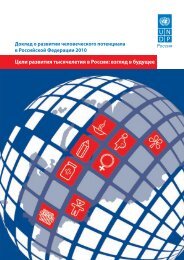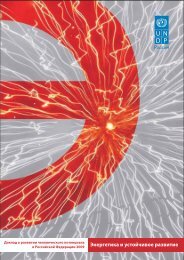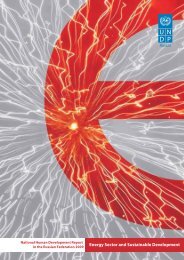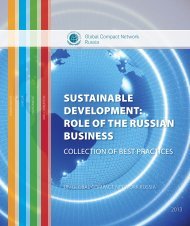Report - UNDP Russia
Report - UNDP Russia
Report - UNDP Russia
Create successful ePaper yourself
Turn your PDF publications into a flip-book with our unique Google optimized e-Paper software.
e adjusted to match best internationalpractice.Volumes of major repair work onresidential buildings declined by four times in2007 compared with 1990 and by almost seventimes compared with 1970. In the 1970s–1980smajor repairs were carried out on 3% of totalhousing stock each year, but the indicators hadfallen to 1.2% by 1990 and to a mere 0.2% in2007. This is an unacceptably low level, whichfails to improve average specifications of theentire housing stock, and only partiallycompensates degradation of the heat insulationqualities of buildings. The major repair rateshould be raised to 3-4%, and relative energyuse for heating should be reduced by at least30% after such repairs. The Housing UtilitiesReform Fund should make allocation of federalbudget funds for major residential repairconditional on installation of meteringequipment and minimum 30% reduction ofrelative energy consumption after repairs arecompleted. Ageing buildings, which require 2-3times more energy than the housing averageand 3-5 times more energy than new buildings,should be demolished and replaced.The government should organizemonitoring and energy efficiency rating ofresidential buildings using special ‘energypassports’. Incentives could be created forenergy saving in the housing sector throughstandard, ‘result-oriented’ contracts forresidential building management. At the sametime households need to learn to manage themanagement companies: whatever theprocedure for selecting the managementcompany, it should not be entrusted with allbuilding management functions, ensuringthat households are in charge of the companyand not the reverse. Managing companiescould act as energy service companies, sellingspecific levels of ‘comfort’ (i.e. specifictemperature, humidity, lighting, elevatorservices, etc.) to households, rather thanvolumes of energy resources. Savings onutilities from improved energy efficiency ofnew and repaired houses should either bepaid to households or used for moreupgrading work on residential buildings. Thisrequires that metering instruments should beinstalled and used for fair billing of utilities.Availability of information is another keyfactor for correct energy efficiency decisions.Markings on household appliances andinsulation materials will help consumers to makethe right choice.Efficient use of energy depends on basictraining in relevant methods. Libraries of bestpractice are needed, offering lists of managerialsolutions. There should also be a network ofenergy efficiency consulting centers to helphouseholds make energy choices. The mediamust be responsible for encouraging people toadopt new energy-efficient behavior. ‘Energysavingdays’ could be held at national andregional levels.Those on low incomes suffer most fromlow energy efficiency, and these people needspecial help. Provision of such help will alsoreduce subsidies and welfare now paid to helplow-income families pay for utilities. The ‘WarmHouse’ and ‘Cheap Light’ programmes should beimplemented in all households and communitieslocated in isolated northern regions of thecountry.5.7. Improvingenergy efficiencyof heating systemsIn over a century of development <strong>Russia</strong>’sheating supply system has grown to become thelargest in the world. In 2006 <strong>Russia</strong> accounted for44% of world production of centralized heat.Centralized heating takes 320 million tonnes offuel equivalent or 33% of all primary energyconsumed in <strong>Russia</strong>, which is equals to totalconsumption of primary energy in such countriesas Great Britain and South Korea. The heatingmarket is one of the largest single-productmarkets in <strong>Russia</strong>. Despite this, <strong>Russia</strong> does nothave a federal management institution oruniform development policy for its heating96 National Human Development <strong>Report</strong> in the <strong>Russia</strong>n Federation 2009












